The rabbi told you the mezuzah would protect your home and all who live inside it. You trust him.
It's not just him. The rabbis of the Talmud take this security feature of the mezuzah as a uniquely distinctive fact of Jewish life.
“Everywhere else in the world,” they say, “the king sleeps in bed while his servants stand by the door to guard him. But with us Jews, it's the inverse. We sleep, and our King stands guard at the door .”1
You trust them, too. How on earth does a parchment scroll with Hebrew inscriptions increase your personal safety?
You just want to understand the mechanics. How on earth does a parchment scroll with Hebrew inscriptions increase your personal safety?
Fair question.
You'll be glad to know you're not the first to ask. It's a classic. So let's take a deep dive into how the issue is treated by the luminaries of the science known as halachah—i.e., what Jews do and why they do it.
The Mezuzah Hypotheses
To approach this scientifically, let's start with a hypothesis. Intuitively, it seems there could only be two possible explanations:
The Parchment & Ink Hypothesis: Jews believe that a particular sequence of letters on parchment has special powers to ward off spooks, unwanted guests, and IRS auditors. Mezuzahs have that sequence down to the tee (or alef).
The Extrinsic Reward Hypothesis: The Torah promises that in return for doing this mitzvah, you get on the divine protection list. In other words, the mezuzah is not doing the protecting. G‑d is. Only that He's doing it because you put the mezuzah there.
You may have other suggestions, but I would guess that they all fall within one of these two categories of intrinsic or extrinsic mechanisms.
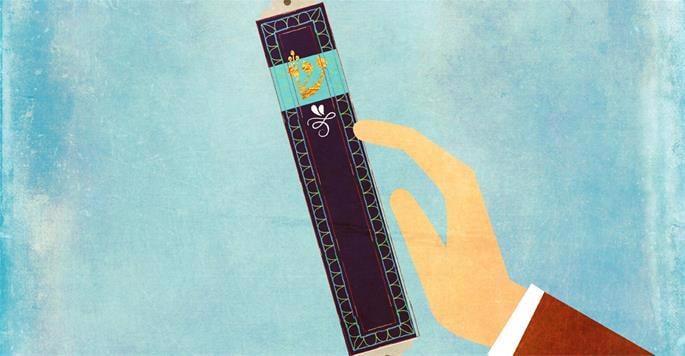
Now let's examine the data:
Angels in Your Mezuzah
Fortunately, we don't have to look far to knock off the P&I hypothesis. Rabbi Dr. Moshe ben Maimon, aka Maimonides, but known to insiders as Rambam (12th century Egypt), already handled that for us in his comprehensive codification of the gamut of Jewish Law known as Mishneh Torah. He brings us right into ground zero of the issue.
Rambam talks about people who figure they can upgrade their mezuzah with some add-ons.
A mezuzah contains two paragraphs from the Torah—one beginning “Listen up, Israel, that G‑d who is our G‑d—that G‑d is One!”2 (a.k.a. “Hear O Israel…” In Hebrew: Shema Yisrael) and the other beginning “And if you will listen….”3 Both those paragraphs make mention of the mezuzah, as we will discuss later. Everything is hand-written in Hebrew letters with extreme precision by a qualified scribe.
These people figure, “That's good, but you can always beef up security, right? So let’s enhance it a little by inserting a few angel-names in key places. After all, angels protect people.”
Rambam says no. First of all, playing around with the prescribed text means you’re not following instructions, and if you're not following instructions, in what way is this a mitzvah (which means a divine instruction)?
But beyond that, Rambam has some rather harsh words for these people:
Those, however, who write the names of angels, other sacred names, verses, or forms, on the inside of the scroll are among those who do not have a portion in the world to come.
These fools, not only have they lost out on the mitzvah, they've made a great mitzvah—the unity of G‑d and our labor of love for Him—into an amulet for their own benefit. They imagine in their foolishness that this is something that benefits a person in some vain, worldly way.4
Now, why is Rambam so upset with these people?Playing around with the prescribed text means you’re not following instructions
Obviously, it’s not because they're doing the mitzvah with their personal benefit in mind. Sure, it’s optimal to “do the right thing just because it’s the right thing,” as he writes elsewhere.5 But he writes that with a caveat: You can’t start people off that way. First you teach them to do mitzvahs for their benefit, and then, gradually, they will come to do it for better reasons, and perhaps, eventually, just “because it’s the right thing to do.”6
Neither could he be attacking the whole mezuzah protection bundle, since, as we have seen, the rabbis of the Talmud state this clearly. And indeed, Rambam writes immediately before these words:
It is a common custom to write G‑d's name ש-ד-י on the outer side of a mezuzah scroll opposite the empty space left between the two passages. There is no difficulty in this, since it is on the outer side.
Why that particular name? The Zohar7 explains that this name describes G‑d as our protector. Others explain that it is an acronym for שומר דלתות ישראל, which means “The Guardian of Jewish Doorways.”8
Rather, he’s criticizing them for believing that the mezuzah protects us in “some vain, worldly way.”
Meaning: Mezuzah protection mechanics are not about the inscriptions on the parchment. Adding in a little amperage of your own doesn't just jam the circuits, it represents a complete misunderstanding of the lofty dynamics involved. Something very big is happening here, and we humans should just do our job as per spec and back off.
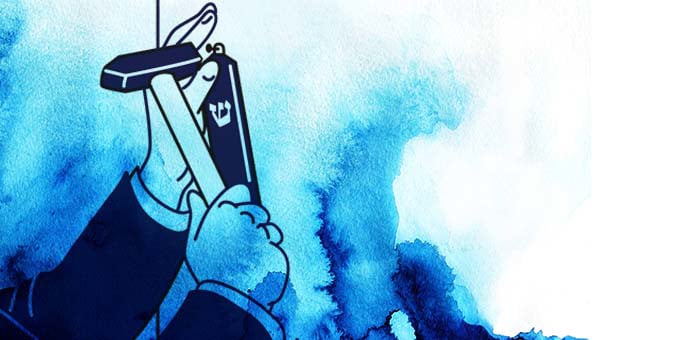
Well, what could that dynamic be? Must be the extrinsic reward hypothesis, right? And, hey, that seems to snap right in with the inverted protocol description of the King protecting His subjects, as well as this description from the Zohar:
Someone builds a home. G‑d tells this someone, “You write My name on your doorpost and I’ll sit outside and protect you.”
It’s just like in Egypt, when He protected those who followed His instructions to put blood on the doorway.9
But not so fast. The text inscribed on the mezuzah scrolls says something quite different:
And you shall write them [i.e. these words] upon the doorposts of your house and upon your gates in order that your days and the days of your children will be many….10
Yes, there is a reward for following this instruction. But it’s not protection. It’s longevity.
Could it be that the rabbis are saying that mezuzahs also protect? Maybe you live long because you are protected.
But no, it’s clear that the tradition is that this is not a reward. It’s just something that mezuzahs do. Here's the evidence, case by case:
Case One: The Rental Situation
You just moved into your rental home in Jerusalem. Fully furnished. But no mezuzahs.
You tell the owner, "Hey, you're Jewish, right? Why no mezuzahs?"
Your Jewish landlord answers, “That's your problem.”
You answer, “Oh yeah? Doesn't it say, 'And you should write them on the doorposts of your house and upon your gates.'? I may be living here, but it's still your house."
Your argument is more robust than you might imagine. It has precedent:
The Torah also says to put tzitzit on the corners of your (four-cornered) garment. So the rules are, if you borrow a garment, you don't need to add tzitzit. It's not your garment. After thirty days, we tell you to tie those tzitzit on—but that’s only because otherwise people are going to say, “What’s that guy walking around with a four-cornered garment and no tzitzit? Don’t tell me it’s borrowed—he’s been wearing it for over a month now!”
Should be the same here with mezuzahs, right? If it’s not your home—because you’re renting—so you shouldn’t need to put up mezuzahs. And after thirty days? Still no reason. Everyone knows that people rent homes for years, even a lifetime.
Proof that if anyone must purchase those mezuzahs and put them up, it’s not you, right?
Wrong. The Talmud rules that the landlord is correct—this is your problem, not his.11
As the rabbis known as the Tosafot (medieval France and Germany) later explained, “A mezuzah is made for protection."12 So it doesn’t make sense to say “It’s not my house. I don’t need a mezuzah.” You’re living there. You need protection.
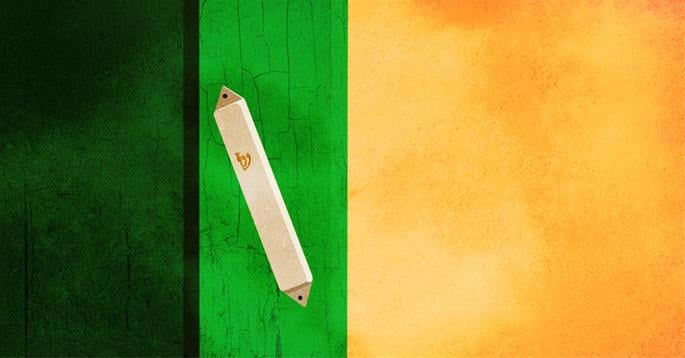
Must be, then, that when the Torah says, “on the doorposts of your house” it means something else. And indeed, the Talmud tells us it means that the mezuzah has to be on your right as you enter, not as you leave.13 (It’s a play on words that only makes sense in Hebrew. But it works.)
Strong language, right? “A mezuzah is made for protection.” Not that you get protection as a reward, but that's what it does. It's a protective device. Intrinsically.
So are the Tosafot rabbis going head to head with Rabbi Dr. Rambam? After all, that's perfectly kosher—11th-century French halachists are allowed to disagree with 12th-century Egyptian ones. They often do.
Maybe, then, what we have here is one of those classic divisions of halachic opinions into two camps: The extrinsic reward of Maimonideans and the intrinsic protection of Tosafot.
Neat. But it doesn't fly. As we see from…
Case Two: The Thick Doorway
You've just moved into a palatial mansion in Boca Raton that will wow your friends and business associates to the ceiling. Problem: The walls are two feet thick at places. And that makes an issue with your mezuzahs. Where do you place them? On the inner end of the doorway? The outer end? Or maybe the middle?
You make a video call to your rabbi and provide him a walkthrough. He instructs you to place the mezuzah on the outer end of the entrance.
Okay, you say. But why? (Jews always ask why. Why? Because how else are you going to learn?)
So he explains that it's actually a discussion in the Talmud.14 And the conclusion is as he said: The mezuzah goes on the entrance-end.
Why? It's a protective device. Intrinsically.
The Talmud provides two lines of reasoning: One, so that you meet the mezuzah as soon as you enter. Two, that of Rav Chanina from Sura: "So that more space gets protected."
There's no way you can fit that into the extrinsic divine reward hypothesis.
Like, let's say you didn't hear the rabbi right and placed the mezuzah at the inner end of the doorway. And then you accidentally dropped your gold, diamond-studded Fitbit in the doorway. By the time you realize, it's gone.
If it's the mezuzah doing the protecting, no point complaining. But if it's G‑d protecting because you did the mezuzah thing, so what does He say? “Sorry, that area is not covered by your policy.” Really?
Now, Rambam bases everything he says on the Talmud. He never will argue with it. Rules are: Rabbis of the Talmud can argue with other rabbis of the Talmud. Rabbis post-Talmud cannot.
So Rambam certainly is going to take any explanation of a halachah by a Talmud-rabbi very seriously. If one of them says that by placing a mezuzah further out, you will extend protection outward, then the mezuzah must have inherent protection properties.
And that is undoubtedly how he has been understood in posterity through the ages, as we see from…
Case Three: The Many Voices of Halachah Cafè
The Arba Turim is an intriguing place to hang out. I say place rather than book because that far better describes how it feels to be absorbed in its study—much like taking part in a vibrant discussion in a Talmudic Cafè.
The cafè has a facilitator, Rabbi Yaakov ben Asher (Spain circa 1300), son of one of the all-time great halachic authorities known as “the Rosh.”
Belonging to a generation that felt the need to preserve the scholarship of a world they realized couldn't last much longer, Rabbi Yaakov created a kind of encyclopedia of the spectrum of opinions on each case of practical halachah. He called its four volumes “Arbah Turim” (“Four Rows”), thereby earning for himself and his book the nickname “the Tur.”
Rabbi Yaakov, the Tur, died in abject poverty, but his work was considered so vital, it was the first book to be published in Southeast Europe and the Near East (Constantinople, 1493)—the year after the Spanish Expulsion.
A century passed and along came Rabbi Yosef Caro (Ottoman Empire, Israel, 16th century) and wrote voluminous notes on one side of the page. He called it “Bet Yosef” (“Yosef’s House”), and so that's how he's been known for generations since: “the Bet Yosef.”
Another hundred years passed, and Rabbi Yoel Sirkes (Poland, 17th century), seeing the other side of the page was still vacant, built his own house there, often taking Rabbi Caro to task. He titled his work “Bayit Chadash”—“A New House”—earning himself an unforgettable title via acronym, “the Bach.”
Rabbis Moshe Isserles and Joshua Falk, despite their chronological precedence, had to resort to staking out the bottom of the page. Finding no space left, future scholars were forced to claim their real estate on Yosef Caro’s abridged version of his own notes, titled “Shulchan Aruch.”
In one of the great miracles of Jewish history, more and more rabbis kept finding space to squeeze in their voices over the ages, amounting to a counterpoint of multifarious voices resembling a dozen fugues (by the other Bach) in tandem.
The result is an accumulative venture that effectively flattens time into a kind of geographical space where everyone is alive at once. To this day, we study halachah by winding our way along the Tur/Shulchan Aruch highway, extending from Moses through the Talmud and the Tur and right up to the present day.

Indeed, in Jewish scholarship, we never say, “So-and-so said…” It's “Rambam says…” “The Tur says…” “Yes, but the Bach says…”
Here are some of the rules of discussion in this cafè:
- Rigor: You must provide textual support, satisfactory reasoning, or precedent for any statement you make.
- Everyone speaks in order of their place on a timeline stretching over hundreds of years.
- You only get to speak once and cannot respond to your detractors. Because by then you're already up in the heavenly academy and we can't hear you too well from down here . Indeed, a lot of the labor of studying—or rather, participating in this work—is trying to guess exactly what these great minds might be responding from up there.
Cafè Consensus
So we're at the cafè, and Rabbi Yaakov, “the Tur,” is introducing the halachot of mezuzah.15 As he speaks, the Bet Yosef, the Bach, et al, call out references for every phrase, grounding it all back to Mishnah and Talmud.
But, in the midst of his words, the Tur slips in a kind of puzzle to unravel. Not in his content, but in his format.
The Tur begins by explaining the weightiness of this mitzvah. Whenever we enter or exit our homes, it reawakens our awareness of G‑d’s oneness, ensuring we will keep all His mitzvahs wherever we go. It's so important, he says, not only does the Torah promise us that “your days and the days of your children will be increased”16 as a reward for this mitzvah, but “yet greater than this, your house is protected by it.”
And then he goes on to explain that this is the reason the mezuzah is placed near the outer end of a thick doorway, for greater protection—as we explained above. Don't do this mitzvah for its protection. Do it because it is a mitzvah given us by the Creator
Nevertheless, he admonishes us, don't do this mitzvah for its protection. Do it because it is a mitzvah given us by the Creator.
Nice. But a hush is already drawn over the cafè. The sages have fallen into deep thought. They are pondering those words: “Yet greater than this…” Really?
Obviously, this one of those enigmatic nuances of a sage in which deep wisdom is sequestered. In what way could the benefits of household protection exceed long life? Isn't one included in the other? Anyone guaranteeing you long life is going to have to protect you, right?
As a matter of course, the Bet Yosef is first to unravel the enigma.17
“For one thing,” he says, “when someone lives a long life due to their mitzvahs, yes a miracle has occurred—but no one recognizes it as such. But when a home is protected by a mezuzah, open miracles occur.”
“And for another,” he continues, “it inverts the natural protocol.” And he goes on to cite the Talmudic statement about kings, servants, beds, and doorways that we mentioned at the beginning of this article.
The Bach has been listening attentively, nodding his head in approval. “Yes, yes,” he says. “But there is something yet more significant.”
“With all mitzvahs, including mezuzah, you're guaranteed some sort of kickback in this world or the World To Come. With the mezuzah, you benefit directly from the mitzvah itself. Through it, your household is protected from all sorts of dangers—in addition to the reward of long life for you and your children.”
Could you say intrinsic in any clearer words?
So is Rabbi Sirkes also parting ways with the esteemed Rambam on this? And how about the Tur, who opens the discussion of the halachot of mezuzah with the reasoning behind the thick-doorway rule? Do we hear Rambam’s voice raised in protest from the heavenly academy?
Quite unlikely. The Tur himself later cites Rambam’s sharp words about the angel-name inscribers verbatim as a final ruling—after he quotes his father, the Rosh, saying just about the same thing.
Okay, but Rambam blasts these fools who treat the mezuzah like an amulet and “that benefits a person in some vain, worldly way.” If the mezuzah is “a mitzvah from which you benefit directly,” as the Bach explained, what then is Rambam’s issue with these people?
Obviously, Rambam doesn't mean that a mezuzah doesn't provide protection. He means it doesn't protect you the way worldly things protect. It’s not about some mysterious power of words on parchment.
So what power is it then?

Obviously, it has to do with the mezuzah being a mitzvah. Proof positive: If the mezuzah is written by someone who is not a shareholder in the whole mitzvah operation—such as a non-Jew or a Jew who denies the whole thing—it doesn't matter how perfect and exquisite a mezuzah he has written, it is simply not a mezuzah and provides zilch. To provide protection, it must be a kosher mezuzah written by a Jew in order to perform this mitzvah.
So it's not the parchment and ink, it's the mitzvah. Perhaps the mitzvah that you are accomplishing by having a mezuzah at your door is protecting you. Like, that mitzvah of yours is somehow perpetually hovering over that doorway in the spot where that mezuzah hangs.
But, no, that doesn’t work either. As we see from…
Case Four: Monobaz and the Mezuzah Staff
Monobaz II was king of Adiabene, a vassal state of the Persian Empire. After his mother, Queen Helena, converted to Judaism, he followed suit. The Talmud tells several anecdotes describing the two. Here’s one:
It seems that in Mishnaic times it was common for a traveler to make a hollow in his staff to hold a mezuzah.18 Of course, there's no mitzvah in doing so. In fact, Rav Yehuda cites the Babylonian sage, Shmuel, as teaching that if you leave such a staff at the doorway instead of affixing the mezuzah directly, you haven't accomplished a thing. Indeed, since the house is technically without a mezuzah, Shmuel said, you're endangering yourself instead of protecting yourself.19

Upon providing this teaching, the Talmud goes on to report that Monobaz did exactly what Shmuel was talking about—but not for his house. Whenever traveling, he would have his servants place their mezuzah-staffs at the doors of the inn where they would stay on the road.20
Of course, he didn't do this for the mitzvah—if you're staying in a place for less than thirty days, you don't need a mezuzah because it's not considered your home. But Monobaz still felt they should have some souvenir of the mitzvah with them.
Now Monobaz could do as Monobaz pleases. The interesting thing here is this mezuzah-staff. What's up with that? It's reported elsewhere, too. And nobody criticizes it, as in "what a waste of a good mezuzah." Or "plain superstitious." In fact, many serious scholars of Torah kept a mezuzah on their desk. The Rebbe, Rabbi Menachem M. Schneerson, advised people to keep a mezuzah in their car.
So here you have an instance where there's no mitzvah involved, and yet some sort of protection is expected. Okay, so again it's not a reward thing for doing the mitzvah, it's intrinsic. But here, you can't even say that the mitzvah is protecting you--because there is no mitzvah.
And yet another wrench in the works:
Case Five: Artaban’s Priceless Gift
Artaban V was the last emperor of the Ancient Persian Empire. He was also friendly with Rabbi Yehudah HaNassi, head of the Jewish Sanhedrin, and a very wealthy man.
The Talmud tells21 that Artaban sent a gift to Rabbi Yehudah, a priceless gem, with a challenge: “Let’s see if you can send me something just as valuable as this.”
So, in return, Rabbi Yehudah sent Artaban a mezuzah.If it's not the ink and parchment of the mezuzah, what is doing the protecting?
Artaban didn't take that so well. He responded with a sharp message to Rabbi Yehudah: "I sent you a priceless gem, and you sent me something I could buy with a few pennies!"
Rabbi Yehudah messaged back, "All that I have and all that you have does not equal the worth of this item."
“And furthermore: The jewel you sent me requires that I guard it, whereas the mezuzah I sent you will guard and protect you, as it is written, "Wherever you go, it will guide you."
At that point,22 Artaban’s princess fell ill. None of the doctors were able to help. Until Artaban affixed the mezuzah to the door, and immediately his daughter's health improved.
This is not Monobaz. No one claims Artaban ever converted. He was likely practicing some sort of Mithraic Zoroastrianism with a mix of Babylonian and Greek gods thrown in for good luck. Certainly, he was not performing a mitzvah by placing a mezuzah on his door.
So, if it's not the ink and parchment of the mezuzah, and it doesn't even require a mitzvah, what then is doing the protecting?
Paradigm Breakdown
The problem is that we're stuck in a paradigm. We're thinking of the mezuzah and the mitzvah as two separate entities. But in truth, they have become one. They become one as soon as the mezuzah is written for the purpose of doing a mitzvah.
In Talmudic lingo, we call that a cheftza shel mitzvah23 —literally meaning: “the object of a mitzvah” (as opposed to the subject who did the mitzvah). The implication: It's no longer an inert physical object on a doorpost (or in a staff, or a glove compartment). That thing is now a mitzvah.

(Specifically, there are gradations of cheftza shel mitzvah. A mitzvah such as mezuzah that contains one of the divine names or some words of Torah is called a cheftza shel kedushah. It cannot be thrown in the trash or brought into an unclean place. That becomes relevant near the end of this article.)
Let's make this real concrete: A Jew sits down and writes a mezuzah as per spec, intending it to be used on some Jewish doorpost. That scroll is a cheftza shel mitzvah. It could protect even Artaban.
Same person writes same mezuzah, but when you ask him what he’s doing, he answers, “Just practicing.” It’s just a scroll. Will it provide protection? No.24
So is it the mitzvah that protects? Or is it the scroll?
They are one and the same. And that answers everything.
Which is what Rambam meant: It’s not the words on the scroll that protect, it’s the mitzvah quality of those words.
Yes, I know it sounds nuts. A mitzvah is an action you do. A mezuzah is an object you do it with. How does action and object, verb and noun, energy and matter, become one?
But that is precisely what a mitzvah is all about. It’s what Torah is all about: The union of opposites, of the inner life of a thing with its outer manifestation. As Rambam writes, “The Torah was given to make peace in the world.”25
Torah unveils a reality in which nothing is extrinsic. G‑d is not extrinsic to the world, and any object in the world is not extrinsic to Him. The whole paradigm of our hypotheses breaks down.
Or as the Midrash describes the event at Sinai, when Torah entered world-space, with a parallel from ancient Mediterranean geopolitics:
There was a king who decreed that the inhabitants of Rome could not go down to Syria, and the inhabitants of Syria could not go up to Rome. So too, when G‑d created the world, He decreed, “The heavens are the heavens for G‑d, and the Earth He gave for human beings.”
But then, when He gave the Torah at Mount Sinai, He annulled the decree. He said, “Lower things [i.e. physical stuff] can ascend above, and higher stuff [i.e. spiritual, heaven-stuff] can descend below. And I will go first!”
And so, it says, “And G‑d descended upon Mount Sinai.” Then, later, “And to Moses, He said, ascend to G‑d.”
Look, G‑d can do whatever He pleases, as it says, “All that G‑d desires, He does, in the heavens and on the earth.”26
So the Midrash is reading this event of G‑d descending upon the mountain (I mean, what on earth does that really mean?) and Moses ascending the mountain as a major shift in the dynamics of our reality. And that it’s only really possible because “G‑d can do whatever He wants.”
And it's saying that this is what Torah is all about: For the inner reality of existence (“heaven”) and the outer reality (“earth”) to fuse as one, whenever and wherever a mitzvah is involved.
Like with that mezuzah on your doorpost. It’s a physical object. But it’s also a divine dynamic. Because really everything is a divine dynamic—everything is regenerated at every moment by divine will. Just that there’s some obstruction to us seeing it that way.
The mitzvah removes that obstruction so that the physical object can now behave as the divine dynamic it truly is. And it does that by affording you protection.
The same with every cheftza shel mitzvah. Each one channels its particular unobstructed divine energy into the world in a very practical way.
For example, money you give to help others, a.k.a. charity.27 As long as it's kosher money (and not, heaven forbid, money acquired through illicit means), that money becomes divine money that channels true wealth and prosperity into the lives of those who receive it, those involved with getting it there, and especially the one who gave it.
Or the tefillin that Jewish men wear on their heads and arms every morning at prayer time. They have their unique effect, connecting the mind and the heart.
Or the candles that Jewish women light before Shabbat. They shine peace into the home.
The point is, these are not just objects. They are post-Sinai objects, returned into harmony with their inner life.
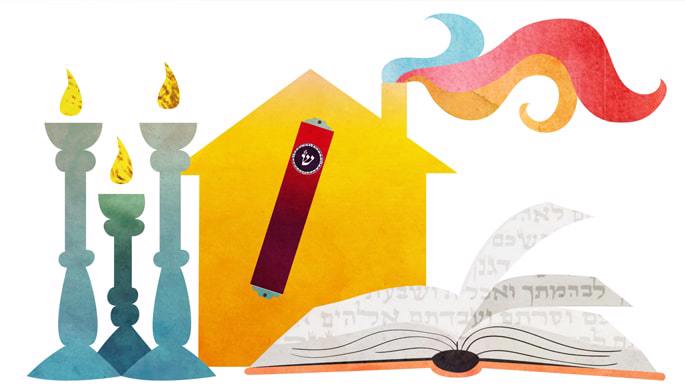
The same applies to you, the person doing the mitzvah. When you immerse your head in understanding Torah, your brain is the mitzvah-object. So, at that time, it becomes a divine brain. A transformation takes place that leaves a permanent impression.28
The same with your heart, which is the cheftza of the mitzvah of prayer. Or your mouth when you recite or explain words of Torah out loud.
It’s especially so when you give of your hard-earned money to a good cause, because then your entire body is engaged in the mitzvah, often to the very core.29
That is why we call it a Torah of life. Because it brings everything in your world alive.
The Case of a Negative Presence of Mezuzah in Prison
One last story. One that takes the power of a mitzvah way out of the box.
What if you’re in a place that does not require a mezuzah—such as a prison? Or a place where the halacha does not permit you to bring a mezuzah—such as a lavatory? Can you still bring the effect of the mezuzah into such a place?
It’s been done.
Saint Petersburg, Russia, is a city of long and dark shadows. Not only because it lies only a few degrees below the Arctic Circle, but also on account of the stories of terror certain of its buildings contain.
Cross over to the south bank of the Neva River on the Liteyniy bridge, drive one short block, and you will find yourself at a complex of buildings that once struck more dread into the hearts of brave men than the inferno of hell. The detention center on Spalerno Street contains 317 solitary cells, 68 mass cells, many “punishment cells,” and a prison hospital assigned for 700 prisoners. In years past, there were occasions when the firing squad worked through the night.
The night of June 14-15, 1927 was one such occasion. That evening, on the pretext of an assassination abroad, the secret police were granted free reign for several hours to arrest, detain, and execute whoever they suspected of insurgent activity.
Rabbi Yosef Yitzchak Schneersohn, the sixth in line in the chain of Chabad rebbes, was on their list, simply because he refused to cease his religious leadership and activism–an act that was deemed by the Bolshevik officials to be counter-revolutionary. Indeed, this was his seventh arrest–yet unquestionably his most perilous.The rabbi proved no easy customer for his interrogators
He was taken from his home at 2:45 AM and driven the few short blocks to Spalerno. The story of his brutal interrogation and the series of miraculous and heroic interventions by which he was eventually released is well known.
The rabbi proved no easy customer for his interrogators. From the start, he resolved not to assign them any authority over him. He responded to their questions only in Yiddish and ignored all their commands. In his words, “I took a tough stance with them, and it cost me my health.”
The word “dignity” does not do justice. Upon entering the interrogation chamber, he stood tall and proclaimed in calculated astonishment, “This is the first time I enter a home and no one gets up from their seat.”
“Do you know where you are?” they asked him.
“Certainly,” he replied. “I am in a place that does not require a mezuzah, similar to a lavatory or a barn.”30
As you can imagine, as much as they tried, by all their demonic means, there was no forced confession forthcoming.
Yet the mention of the mezuzah requires some pause. What exactly was the rabbi’s point? If these henchmen truly had no significance for him, why bother noting how unimpressed he was with the environs in which they met? What need was there to instruct such people in the laws of mezuzah?
The rabbi’s son-in-law, Rabbi Menachem M. Schneerson, asked these questions, and provided the following interpretation:31
True, you can't nail up a mezuzah in a prison. A mezuzah belongs on the door of your home or of any place in which you wish to dwell. The entire meaning of a prison, on the other hand, is that it is a place where you don't wish to dwell—otherwise, the very same edifice would not be a prison.
But, nevertheless, even in such a place the mezuzah can have its effect. How?
Simply by discussing the relationship of this place to the mitzvah of mezuzah, this particular prison was in some way transformed. In a backdoor, inverted way, the light of the mezuzah had made its way into the inferno of Spalerno. It became no longer just a prison. It became a detail in a commentary to a mitzvah.
And indeed the commentary is not as simple as it seems: A lavatory is a place where you are not permitted to post a mezuzah—because bringing it there would be a dishonor to the sanctity of the scroll. A barn does not require a mezuzah, since it's a home for animals, not people. To which was the rabbi comparing the prison? Perhaps to both? Alternatively, perhaps the barn, as some suggest, is also not a permitted place for a sacred scroll.
At any rate, the essential point is empowering: If even in the hell of Spalerno one could bring the divine energy of a mezuzah with a few words of Torah, then certainly there couldn't be any place on earth in which we are not empowered to reveal the divine—as long as we have the dignity and the courage to do so.
Based on Likutei Sichot, vol. 19, Ekev 5.

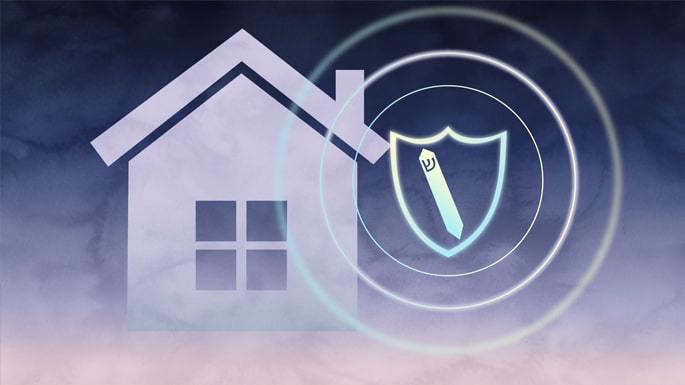

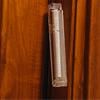





Join the Discussion